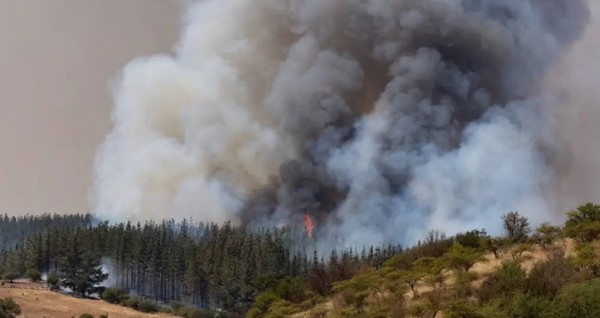Conaf urged heightened precautions, particularly in Antuco, Alto Biobío, Mulchén, Negrete, and Los Ángeles, calling on the community and authorities to reinforce prevention measures and act responsibly in the face of severe environmental disaster threats.
The National Forestry Corporation (Conaf) declared a "Red Button" status in the communes of Antuco, Alto Biobío, Mulchén, Negrete, and Los Ángeles due to adverse weather conditions significantly increasing the risk of wildfire ignition and spread.
This alert status entails reinforced prevention and awareness measures in these territories. The "Red Button" declaration not only reflects an imminent risk but also serves as an urgent call for joint action by authorities, municipal teams, and the community to prevent environmental and human tragedies.
Regarding this, Negrete Mayor Alfredo Peña, one of the communes with an active Red Button, noted that so far, "fortunately, we've had only very minor outbreaks." However, he emphasized, "We are focused on prevention and being prepared to handle any emergency. Additionally, we educate the community on necessary measures to avoid incidents, such as banning bonfires and stressing extreme caution in recreational areas."
Similarly, the municipality has strengthened its communication strategy through its website, sharing recommendations and reminders with residents. "It’s crucial for the community to cooperate and avoid actions that could contribute to a wildfire. We have all mechanisms open to report and properly address any eventuality," the mayor stressed.
PERMANENT MONITORING
The National Disaster Prevention and Response System (Sinapred) has intensified its coordination, monitoring, and prevention efforts to address potential wildfire outbreaks.
In line with prior notices, based on Document No. 264 from Senapred Biobío, specific actions were established for municipalities to implement immediately:
Preventive patrols: Constant patrols must be conducted in high-risk areas, recording resources used (equipment and personnel) as well as observed outcomes.
Activation of communal emergency plans: Each municipality must ensure its action plans are fully operational and adapted to the current situation.
Intensive monitoring: It is essential to supervise high-risk areas to detect and act swiftly against potential fire outbreaks.
Awareness campaigns: Informing and educating the community about risky behaviors and how to avoid them is key to reducing the likelihood of incidents.
All information gathered from these actions must be reported to the Early Warning Unit (UAT) Biobío, enabling a consolidated regional overview and strengthening interagency coordination.
Wildfires have devastating consequences, affecting not only the environment but also communities, local economies, and critical infrastructure.
In regions like Biobío, where the landscape is dominated by vast forested and rural areas, the impact can be irreparable—as seen in 2017 and 2023—if timely measures are not taken.
The "Red Button" also serves as a reminder that climate change is exacerbating risk conditions, with higher temperatures, intense winds, and lower humidity. These conditions create an environment where even a small oversight can turn into a catastrophe.
Conaf calls for strengthening preventive education at all levels. From school workshops to mass social media campaigns, information is a powerful tool to change behaviors and raise awareness about protecting the territory.
THE CRUCIAL ROLE OF THE COMMUNITY
Wildfire prevention does not rely solely on authorities; it requires active citizen collaboration. In this context, Conaf highlights the importance of adopting the following measures:
Avoid burning: Burning waste or agricultural residues is strictly prohibited under these conditions.
Caution with tools: Do not use spark-generating tools like chainsaws or welders near dry vegetation.
Cigarette safety: Never discard cigarette butts or lit matches in rural or forested areas.
Report risky situations: Immediately notify local authorities or CONAF’s emergency line (130) upon any signs of fire or negligent behavior.
Source:La Tribuna







Comentarios (0)
No hay comentarios aún. ¡Sé el primero en comentar!
Deja un comentario